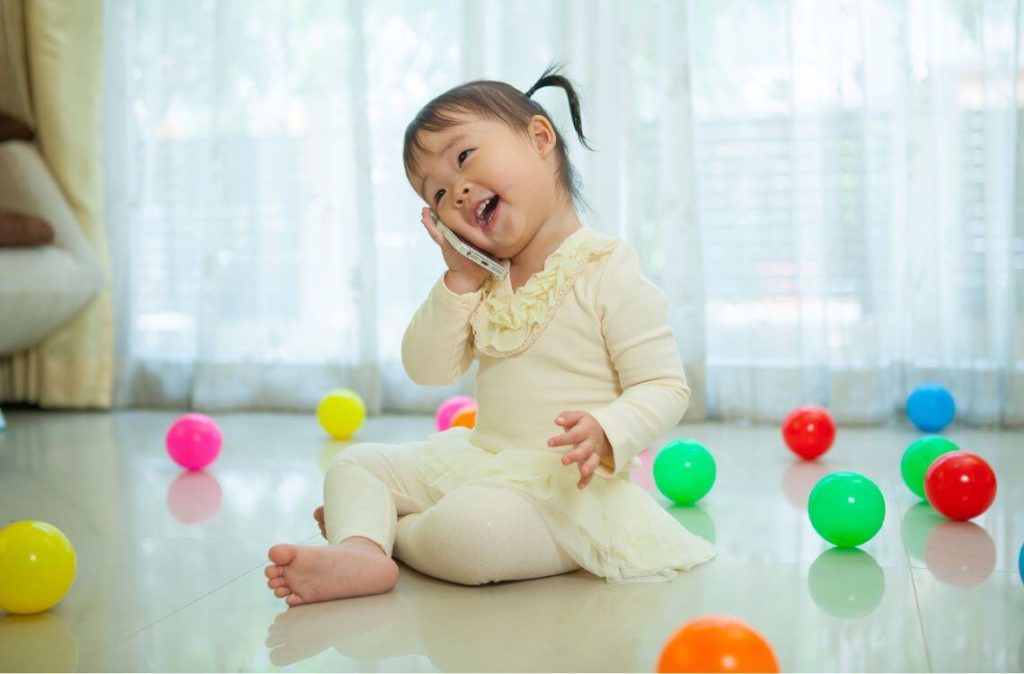Of all baby milestones, talking is one of the most anticipated.
With all this pressure to perform, how do you make sure your child is approaching baby talk in a way that they are actually learning and progressing?
Why Do Babies Need Motivation to Talk
Humans are incredibly capable and independent but a little encouragement goes a long way.
When you motivate your baby to babble and make noise it gives them the confidence to progress into speech.
Most babies begin to talk after the one year mark, but some may start even sooner. They will start babbling around four months old and will only get better from there with the right guidance.
Some children take some time to communicate. It may be shyness or that they are just unwilling but no matter what the reason, give your baby some space.
Not all children develop at the same rate and taking a little longer to progress verbally does not mean they are getting left behind. Letting your baby take their time to develop at their own pace will do a lot to help them on this journey.
Your job as a parent is to give them the encouragement they need to improve their baby talk.
How to Encourage Baby Talk
Conversation
Tell your baby about your day. The conversation may seem one-sided. However, introducing new words and communicating with them increases the chances of them picking up what you’re saying.
It may seem a little silly to try having a conversation with someone who can’t even speak yet, but they will feel included and be motivated to start joining in as well.
Questions
Ask them questions throughout the day; whether or not they give you answers.
You can provide the answers yourself as a way for them to learn new things.
For example while playing with toys you might ask “What’s your favourite animal? Mine is a cat!” while pointing out a cat toy.
Letting your baby answer these questions (even if its nonsense) will give them an idea about the structure of a conversation.
Reading
Reading simple stories creates a more exciting environment to learn things. Your pitch and intonation when reading also tends to be more interesting.
Books also act as a form of enrichment. Get sturdy books that your baby can handle without crumpling; they will enjoy flipping pages and looking at the pictures.
Labelling
During playtime you can start labelling the toys your baby is playing with. Giving each item a name will familiarize them with the words, especially if it is repeated often.
Make sure you use the same words to describe things so you don’t confuse your baby. If you always say ‘cat’, saying ‘kitty’ might throw them off.
Try pointing out flowers, trees and animals when you take a trip to the park. You can also use this method to name places, like the kitchen or bathroom.
Singing
There is a reason nursery rhymes are so popular as a teaching method.
It is easier to pay attention to what is being said when there is a catchy tune behind it.
Singing to your baby might help them catch onto words faster.
Try famous nursery rhymes or popular songs. You can even make up your own tunes as you talk to your baby.
Media
Television and other screen media is a tricky thing when it comes to babies.
On one hand it can be a useful educational tool but on the other it can be addicting and affect their development negatively.
It is true that watching television can improve speech as children mimic what they see on screens. This is why choosing the right shows is important.
Your baby can be exposed to television shows but you need to oversee what kind of media they are consuming.
Don’t turn on the screen and walk away; Find educational and interesting things for them to watch and control their screen time.
It may be difficult to find the time to constantly supervise your baby and screen time is the best ay to occupy them while you are busy.
There is no shame in using this tool to help you from time to time but avoid making it a habit.
Listening
When your baby is babbling out the nonsense that is baby talk, listen to them like what they are saying makes perfect sense. No one likes to be ignored and babies aren’t any different.
Pay attention to them and nod along to indicate your interest.
This will motivate them to continue talking and one day they will start forming real sentences and speaking coherently.
Rest
Not everything has to be a teaching moment; and as tempting as it is to push your child to improve themselves, they need rest too.
If they seem disinterested or tired leave the learning for another time and rest both your voices.
What Comes Next
It is incredibly exciting to hear your baby’s first words, but remember not to rush them into speaking.
Patience is a key factor in child development and life is not a race.
Give your baby your time and love and they will flourish at their own pace.
For more insightful stories and fun recipes, stay tuned to Motherhood Story!
